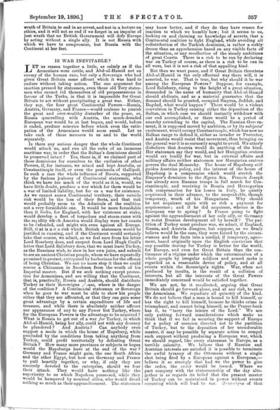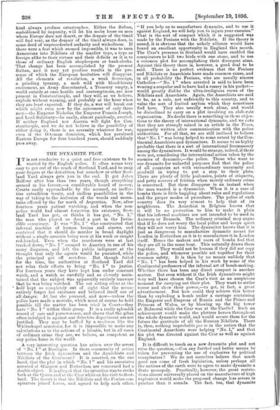IS WAR INEVITABLE ?
LET us reason together a little, as calmly as if the Armenians were cattle, and Abd-ul-Hamid not an enemy of the human race, but only a Sovereign who had given Great Britain some affront which it was hard to endure without taking action. The one argument for inaction pressed by statesmen, even those old Tory states- men who cannot rid themselves of old prepossessions in favour of the Turks, is that it is impossible for Great Britain to act without precipitating a great war. Either, they say, the four great Continental Powers—Russia, Austria, Germany, and France—would coalesce to punish the great and over-wealthy disturber of the peace, or, Russia quarrelling with Austria, the much-dreaded European war would be at last begun, and would, before it ended, produce miseries before which even the extir- pation of the Armenians would seem small. Let us take each of these menaces to us and to the world separately.
Is there any serious danger that the whole Continent would attack us, and run all the risks of an immense maritime war, in order that the Sultan's dominions should be preserved intact ? Yes, there is, if we claimed part of those dominions for ourselves to the exclusion of other Powers, if, for instance, we seized and kept Anatolia, or Constantinople itself, or even the peninsula of Gallipoli. In such a case the whole influence of Russia, supported by the furious jealousy of Continental statesmen, who think we have too much of the world as it is, would, we have little doubt, produce a war which for them would be a war of limited liability, but for us a war for existence. As we cannot annex Continental territory, their outside risk would be the loss of their fleets, and that risk would probably seem to the Admirals of the coalition not a very formidable one. It would be more formidable than it looks, for England, with her existence at stake, would develop a fleet of torpedoes and steam-rams with the raj idity which America would display were her coasts to be defended, and might win even against all Europe. Still, ti at is n3t a risk which British statesmen would be justified in running, and if the Continent would certainly take that course, we admit, as we feel sure from his letter Lord Rosebery does, and suspect from Lord Hugh Cecil's letter that Lord Salisbury does, that we must leave Turkey, as the Russians wish, to stew in her own juice, and submit to see an ancient Christian people, whom we have repeatedly promised to protect, extirpated by barbarians for the offence of being Christian. We can no more stop it than we could rescue a Chinaman in Szechuen from the wrath of his Imperial master. But if we seek nothing except protec- tion for Armenians, and are willing that the Continent, that is, practically, Russia and Austria, should distribute Turkey as their Sovereigns 2'ease, where is the danger of the coalition ? A Continental statesman or Sovereign when he goes to war must be able to show his people either that they are affronted, or that they can gain some great advantage by a certain expenditure of life and treasure, and while there is absolutely neither affront nor appearance of any to any Power but Turkey, where for the European Powers is the advantage to be acquired ? What is Russia to get out of a war for Turkey, in which Abd-ul-Hamid, being her ally, could not with any decency be plundered ? And Austria ? Can anybody even suggest a mode in which the house of Hapsburg, while precluded by the conditions from taking anything from Turkey, could profit territorially by defeating Great Britain ? How many more provinces or subjects or hopes would the Hapsburgs have at the end of the war ? Germany and France might gain, the one South Africa and the other Egypt, but how are Germany and France to pull heartily together, or why, if only they are sincerely devoted to the enterprise, should we fear their attack. They would have nothing like the superiority to us which Napoleon possessed, while they would be hampered by nominal allies, who would dread nothing so much as their aggrandisement. The statesmen may know better, and if they do they have reason for inaction to which we humbly bow; but it seems to us, looking on and claiming no knowledge of secrets, that a. Continental coalition to fight England, while avoiding all• redistribution of the Turkish dominion, is rather a sickly, dream than an apprehension based on any visible facts of the situation, or any recollection of the steady ambitions. of great Courts. There is a. risk to be run by declaring- war on Turkey of course, as there is a risk to be run in all wars, but it is not a risk of that appalling kind.
But then we want peace, and if Great Britain threatens- Abd-ul-Hamid in the only effectual way there will, it is asserted, be war. That is true, but why should it be war among the European Powers ? Suppose, for example, Lord Salisbury, rising to the height of a great situation, demanded in the name of humanity that Abd-ul-Hamid' should abdicate, and as a material guarantee that the demand should be granted, occupied Smyrna, Jeddah, and Bagdad, what would happen ? There would be a violent convulsion in Turkey causing either the deposition of the Sultan, in which case we should instantly withdraw with- our end accomplished, or there would be a period of anarchy extending to the capital. The Russian Govern- ment, it is supposed moved by ambition, or by its subjects' excitement, would occupy Constantinople, which has now no Balkan range to defend it, either as invader or Protector, and Austria would resist that movement, thus bringing on the general war it is so earnestly sought to avoid. We utterly- disbelieve that Austria would do anything of the kind. Her statesmen say they would, and her Hungarian orators would cry loudly for war, but in external affairs and. military affairs neither statesmen nor Hungarian orators- govern the dual. Monarchy. The house of Hapsburg still guides Austrian policy, and the interest of the house of Hapsburg is a compromise which would stretch the - Emperor's dominion to the ../Egean Sea. Francis Joseph.. has already seen Russian troops in full march for Con- stantinople, and receiving in Bosnia and Herzegovina. rich compensation for his losses in Italy, he quietly- acquiesced in their advance, to the unspeakable, though temporary, wrath of his Hungarians. Why should' he not acquiesce again with so rich a payment for acquiescence ; and if he did acquiesce, whence is the European war to spring ? Is France going to fight against the aggrandisement of her only ally, or Germany; to resist Russian development all by herself ? The par- tition of Turkey must produce war, we admit, if England, Russia, and Austria disagree, but suppose, as we firmly believe would be the case, they were forced by the circum- stances and the facts into a cordial, if temporary, agree- ment, based originally upon the English conviction that any possible destiny for Turkey is better for the world,. for Europe, and even for Great Britain than the con- tinuance of a regime under which the extermination of a whole people by irregular soldiers and armed mobs is regarded as a reasonable device of policy, and at all events within the Sovereign's rights. War, when not produced by insults, is the result of a collision of interests, but all the interests of the Great Powers immediately concerned would be satisfied together.
We are not, be it recollected, arguing that Great Britain should go forward alone, and at any risk, to save the Armenians. We repudiate all quixotry of the kind_ We do not believe that a man is bound to kill himself, or has the right to kill himself, because he thinks crime is triumphant, and cannot bring himself, as the Prayer-book has it, to " tarry the leisure of the Lord." We are only putting forward considerations which make us think that if we fail in securing the support of Europe for a policy of coercion directed not to the partition of Turkey, but to the deposition of her unendurable master, it may be possible by separate action to compel such support without producing a European war, which. we should regard, like every statesman in Europe, as a terrible calamity. We believe that if Russian and Austrian interests are satisfied it is possible to terminate the awful tyranny of the Ottomans without a single shot being fired by a European against a European,— believe it so strongly that had we the power to give the order, the order would be issued. Where we part company with the statesmanship of the day alto- gether is as regards its belief that the present master of Turkey can be maintained in power without events occurring which will lead to ear. Onvere;izes of that.- kind always produce catastrophes. Either the Sultan, emboldened by impunity, will let his mobs loose on men whom Europe dare not desert, or the despair of the timid will find vent, as the despair of the timid always does, in some deed of unprecedented audacity and wickedness. If there were a feat which seemed impossible, it was to turn Armenians into Nihilists of the manlier type, a type as foreign alike to their virtues and their defects as it is to those of ordinary English shopkeepers or bank-clerks. That change has been accomplished by the present Sultan, and it may yet produce results in the pre- sence of which the European hesitation will disappear. All the elements of revolution, a weak Sovereign, a grinding tyranny, a mob wild with bloodthirsty -excitement, an Army discontented, a Treasury empty, a world outside at once hostile and contemptuous, are now present in Constantinople, and they will, as we believe, -explode without warning, and probably at the hour when they are least expected. If they do, a war will break out which might even now by the agreement of only three men—the Emperor Nicholas, the Emperor Francis Joseph, and Lord Salisbury—be easily, almost painlessly, averted. If neither England nor Austria will fight for Con- stantinople, and we do not believe in the possibility of either doing it, there is no necessity whatever -for war, even if the Ottoman dominion, which has paralysed Eastern Europe for four hundred years, should suddenly pass away.



































 Previous page
Previous page